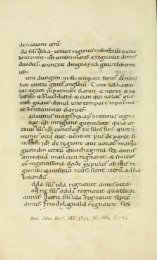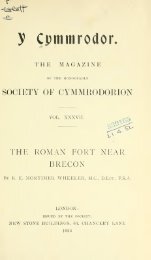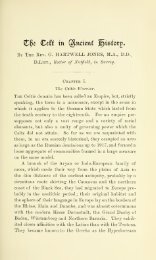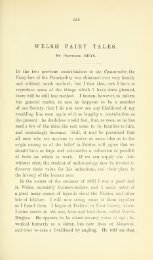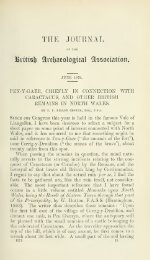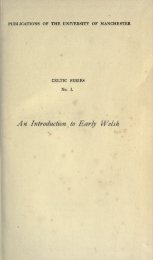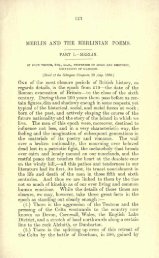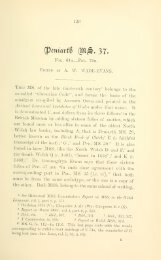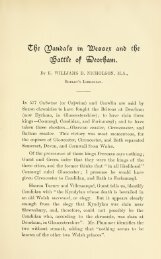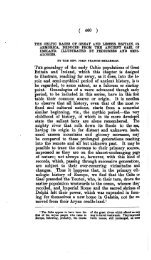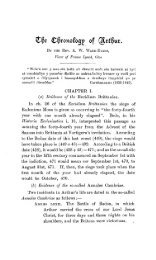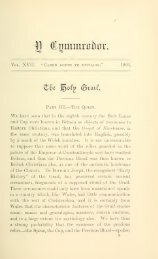Vandals in Wessex postscript (Gormund & Isembard) - Kingarthur ...
Vandals in Wessex postscript (Gormund & Isembard) - Kingarthur ...
Vandals in Wessex postscript (Gormund & Isembard) - Kingarthur ...
You also want an ePaper? Increase the reach of your titles
YUMPU automatically turns print PDFs into web optimized ePapers that Google loves.
Gorniuna and Isenibara. 155<br />
Gurmon. And it is suggested that the Gurmond of the<br />
French romance is a compound of this Wurm and of<br />
Guthorm.<br />
M. Lot says that Geoffrey must have been <strong>in</strong> Normandy<br />
<strong>in</strong> and before 1128^ as chapla<strong>in</strong><br />
to Guillaume<br />
Cliton, i.e. William, son of duke Eobert of Normandy.<br />
If so, he would naturally visit St. Riquier and hear the<br />
Guaramund story there. When he got back to Englaud<br />
and came to write his "History", he obviously confused<br />
the capture of Cirencester by<br />
the encampment of the Danes <strong>in</strong> 879.<br />
the West Saxons <strong>in</strong> 577 and<br />
And here the question arises, "How comes Geoffrey to<br />
be so <strong>in</strong>terested <strong>in</strong> Cirencester, or to know anyth<strong>in</strong>g about<br />
the siege of 577"? He shows no sign of hav<strong>in</strong>g consulted<br />
an Anglo-Saxon chronicle : if he had, he would<br />
liave known that Bath and Gloucester were captured <strong>in</strong><br />
the same year, and would hardly liave omitted to name<br />
theiii. Moreover, :—<br />
<strong>in</strong> liis poem<br />
011 Merl<strong>in</strong> he makes the<br />
latter prophesy<br />
Hunc Itipus aequoreus debellans v<strong>in</strong>cet et ultra<br />
Sabr<strong>in</strong>am victum per barbara regna fugabit.<br />
Idem Kaer Keri'- circumdabit obsidione<br />
Passeribusque domos et moenia trudet ad imum.<br />
Classe petet Gallos, sed telo regis obibit.<br />
Here we have three new facts (1)<br />
that the <strong>in</strong>vader<br />
captured tlie town by means of sparrows (wliich, later<br />
9th. In those French dialects <strong>in</strong> which W- reraa<strong>in</strong>s, the Keltic<br />
yernacular was doubtless Goidelic— see the map <strong>in</strong> my Reltic<br />
Researches, at p. 113. Hariulf himself used G- forms, as <strong>in</strong> Gualaricus<br />
for Valery, and even <strong>in</strong> the middie of a word, as Illudogvicus {-gui-).<br />
1 The Dict. of Nat. Biorj. is silent about this chapla<strong>in</strong>cy, and M.<br />
Lot gives no authority.<br />
2 i.e. Cirencester. Either we should read Ceri=Cer<strong>in</strong> (Cor<strong>in</strong>ium),<br />
or at any rate that must have been aii earlier form. Note that here<br />
he seems to make the <strong>in</strong>vader capture the city aftei- driv<strong>in</strong>g the<br />
British k<strong>in</strong>g across the Severn.



